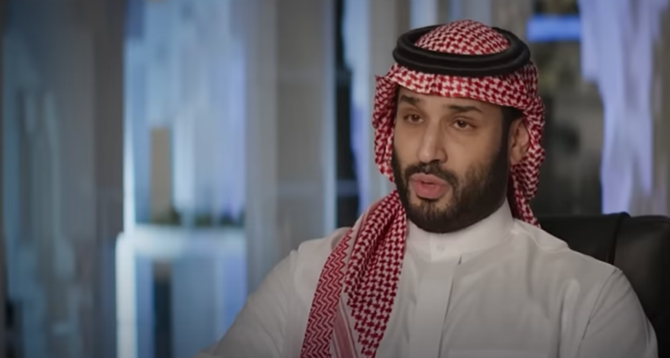RIYADH: Crown Prince Mohammed bin Salman has discussed some of the earliest ideas around the design of The Line, Saudi Arabia’s megacity of the future, and what the project means to the Kingdom and the world.
The ambitious modern city is part of Saudi Arabia’s flagship development project of NEOM, situated in the north of the Kingdom, and reimagines what urban living should be like in the 21st century.
The Kingdom wants to create a new civilization for the future and has urged countries to act similarly for the sake of building a better planet, the crown prince said in a Discovery Channel interview about The Line that aired on Monday.
He talked in the documentary about how the design idea behind The Line came about and what it will eventually mean for Saudi Arabia.
“Since we have an empty place, and we want to have a place for 10 million people, then let’s think from scratch,” the crown prince said.
ولي العهد السعودي الأمير #محمد_بن_سلمان : أعدكم بأن #نيوم ستكون شيئًا جديداً ومبدعاً، ولكن ما هو؟ فهو من غير المعروف.. وسنرى ذلك"#السعودية pic.twitter.com/eMdSaKPsLI
— العربية السعودية (@AlArabiya_KSA) June 27, 2023
“We talked about a lot of ideas, ‘why can’t we build a circle?’” he said, recalling the first steps in the city’s design process. We can connect it with mobility and build it “slowly until it was completed for 10 million people,” the crown prince added.
After brainstorming and a competition for the best designers for ideas on how the city should look, one design option stood out.
“They provided us with cities based on the existing methods but with better solutions,” he said. Except one, who said: “Let’s turn it from a circle to a line.”
From there, the crown prince suggested a tweak that would establish The Line’s iconic look.
“The infrastructure idea is good, but when you get in it, with the 2 km width, you don’t feel it,” he said. “I told the team, ‘how about if we take those 2 km and flip it (so that it is) two towers (across) the whole line, is that going to work or will it be too massive?’”
The result: A 170-km, 200-meters-wide urban design phenomenon that will run on 100 percent renewable energy, with 95 percent of land preserved for nature — and it will be car-free.
The look of the city was unveiled by the crown prince in 2022. He said the design would clarify the internal structure of the multilayered city and address the problems of traditional flat, horizontal cities.
The crown prince said the Saudi population in 2030 is expected to be between 50 and 55 million, significantly up from the current 33 million. “In 2030, we are going to reach the full capacity of the existing infrastructure of Saudi Arabia,” he said, which necessitated the creation of the new city.
“The Line will tackle the challenges facing humanity in urban life today and will shine a light on alternative ways to live,” the crown prince is quoted as saying on the project’s official site. “We cannot ignore the livability and environmental crises facing our world’s cities.”
He added: “Any new city is going to have to be top-down.” Existing cities, he said, have all undergone restructuring based on a constant problem-solution model, but a top-down solution facilitates building something like The Line.
The crown prince said that it was not enough for the futuristic city to just be technically possible, it had to be beautiful too.
“Engineering and design was not enough without art,” he said. “(We) don’t want to create a city without having the whole city as a piece of art.”
The crown prince said the project is grand in scope and fulfills its financial and other objectives.
“It’s massive, it’s huge,” he said, adding that he wishes he could explain it in a simpler way. “It’s something that creates a new way of building.”
The crown prince said Miami has a work and social life mix that is exciting for residents and The Line will aim to top that type of offering.
“In Miami, when you get out of your office, you are on vacation — immediately you are next to entertainment, culture, sport and retail,” he said. “We are competing with Miami.”
Residents of The Line will only have a five-minute walk to reach all facilities and high-speed rail will provide an end-to-end transit of 20 minutes.
Nadhmi Al-Nasr, NEOM’s CEO, said that works are progressing in the futuristic city as per the schedule.
Peter Fitzhardinge, head of tourism and marketing at NEOM, told Arab News: “The development is being done. NEOM is becoming a reality. I live in NEOM and I see developments every minute of every day. You have to come to NEOM to see the future of livability in the world.”
Of those that keep saying the current megaprojects in Saudi Arabia are too ambitious and cannot be done, the crown prince said: “They can keep saying that and we can keep proving them wrong.
“I can promise you there’s going to be something new and creative (in NEOM), but what is it? It’s unknown, we are going to see.”
















